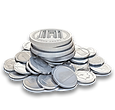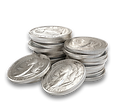How to Sell Palladium Coins: A Complete and Practical Guide
- GoldsilverJapan

- Oct 13, 2025
- 6 min read
Palladium, a rare and highly valuable precious metal, has grown significantly in demand among industrial users, investors, and collectors. With its scarcity and unique properties, palladium coins are not only beautiful collectibles but also valuable financial assets. If you're looking to sell palladium coins—whether for profit, portfolio rebalancing, or liquidity—understanding how to do it strategically is key to getting the best return.
This comprehensive guide walks you through everything you need to know about selling palladium coins: market insights, pricing, authentication, sales channels, and smart practices. Whether you’re a collector or a first-time seller, this article will help you sell wisely and securely.
🌐 Why People Sell Palladium Coins
Like any investment, there comes a time when selling is necessary. Some of the most common reasons for selling include:
Profit-taking after price increases
Switching asset types (e.g., from palladium to gold or real estate)
Financial needs or liquidity purposes
Changing investment strategies
Reducing storage risks
Regardless of the reason, the selling process requires care and attention—especially because palladium is less commonly traded than gold or silver.
📈 Understanding the Palladium Market
Palladium is one of the rarest precious metals, even more scarce than gold. Its price has historically been volatile, largely due to:
Strong industrial demand, especially for catalytic converters in automobiles
Limited supply (primarily mined in Russia and South Africa)
Shifting investor sentiment
Geopolitical influences and trade restrictions
🪙 Current Spot Price of Palladium
As of now, palladium trades around $1,500 USD per troy ounce. However, keep in mind that spot prices fluctuate daily, and your actual sell price may be influenced by additional factors such as:
Coin type and rarity
Condition and grade
Market premiums
Dealer margins
🔍 Step 1: Identify and Understand Your Coin
Before you consider selling, you must know exactly what you own. Not all palladium coins are created equal, and values can vary widely depending on type, mintage, and grade.
Popular Palladium Coins:
American Palladium Eagle
Canadian Palladium Maple Leaf
Russian Ballerina Palladium Coins
Isle of Man Palladium Nobles
Chinese Panda Palladium Coins
Key Info to Know:
Mint and Year: Some mint years carry higher premiums due to low mintage.
Weight and Purity: Typically, 1 oz of .9995 fine palladium.
Certification: Graded by PCGS or NGC? Certified coins often fetch higher prices.
Condition: Proof vs. BU (Brilliant Uncirculated) coins vary in desirability.
✅ Pro Tip: A coin with PCGS MS70 (perfect grade) will command significantly more than an ungraded, worn coin—even if both are the same year and mint.
📊 Step 2: Research the Market Value
Before listing or offering your coin, check its current market value. Don’t settle for guessing—research comparable coins and recent transaction prices.
Where to Research Palladium Coin Prices:
Kitco, APMEX, JM Bullion – for live spot prices and retail sell/buy pricing
eBay Sold Listings – see what similar coins have actually sold for
Goldsilverjapan – offers live buyback prices, including for graded coins, with transparent pricing based on coin type and condition
🧠 Look for both the retail price and the buyback price to set realistic expectations.
📁 Step 3: Gather Documentation
Having the right documentation can increase buyer confidence and help you get better offers. Be prepared with:
Certificates of authenticity (if included at purchase)
Grading certification (from PCGS or NGC)
Original purchase receipts
High-quality photographs (front, back, and grade label)
In competitive markets, transparency is key. Well-documented coins often sell faster and for higher prices.
💼 Step 4: Choose the Right Selling Method
Where you sell can affect not only your profit but also your safety and convenience. Here are the top-selling options:
🏪 1. Local Coin Dealers or Bullion Shops
Pros: Fast payment, no shipping risk, face-to-face trust
Cons: Lower buyback rates, limited competition
A good option for quick sales or if you have a relationship with a trusted local dealer. Always compare at least two or three shops.
🌐 2. Online Dealers
These platforms often offer competitive pricing, insured shipping, and national or international coverage.
One noteworthy option is Goldsilverjapan, which has earned trust in the global market—especially among sellers of palladium and platinum coins.
Why Goldsilverjapan?
Known for being one of the lowest-cost dealers in Japan
Offers real-time buyback prices, updated according to global market fluctuations
Accepts graded and raw coins
Transparent pricing—clearly displays buyback offers by coin and grade
Ships and buys internationally
Customer service available in multiple languages
Also offers educational content on YouTube, helping new sellers understand pricing, grading, and market timing
✅ Sellers can check exact buyback values online before committing, providing full price clarity before mailing in coins.
💻 3. Online Marketplaces (eBay, Yahoo Auctions)
Pros: Global exposure, potential for high bids
Cons: Fees, fraud risk, shipping hassle
This method is better for rare or graded coins where buyers are looking for specific series or mint years. But be aware of scammers and make sure to fully insure any shipments.
🏛️ 4. Auction Houses
Specialty numismatic auction houses like Heritage Auctions or Stack’s Bowers can be a good fit if you have high-value or extremely rare palladium coins.
Pros: Access to serious collectors
Cons: High commissions (up to 20%), longer wait for payment
📦 Step 5: Securely Package and Ship
When selling online or mailing your coins, secure handling is critical:
Use tamper-proof packaging
Fully insure the package
Get tracking numbers
Take photos of your coin before shipping
Follow the buyer’s instructions precisely
Goldsilverjapan, for example, provides clear instructions for shipping and often supports insured options for sellers.
💬 Step 6: Negotiation and Final Sale
If you're using a direct sale or a peer-to-peer platform, you may have room to negotiate. When using online dealers or platforms with fixed pricing, the value is often non-negotiable but still transparent.
Questions to ask:
Are there any fees or commissions?
Is the offer based on today’s spot price or delayed rates?
When will payment be made?
How will the funds be delivered (bank transfer, PayPal, etc.)?
🧾 Step 7: Understand Tax Considerations
Selling precious metals, including palladium, may involve capital gains tax depending on your jurisdiction. While we can’t offer legal or tax advice, here are a few pointers:
Check if your profit margin is taxable
Keep receipts and sale records
Report gains accurately if required
Consult a tax advisor for your specific region to avoid surprises later.
📈 Tips to Maximize Value When Selling Palladium Coins
Tip | Why It Matters |
Compare multiple dealers | Avoid being underpaid |
Sell graded coins | More value and trust |
Time your sale with market trends | Take advantage of high prices |
Use transparent platforms | Avoid hidden fees |
Avoid lowball offers | Patience pays off |
📌 Sample Sell Workflow: Using Goldsilverjapan
Visit the website and select "Sell Coins"
Choose your coin type (e.g., Palladium Maple Leaf)
See real-time buyback offer by grade (MS69, MS70, BU, etc.)
Package your coin securely using provided guidelines
Ship with tracking and insurance
Get paid after coin is authenticated
It’s simple, clean, and transparent. What makes Goldsilverjapan stand out is its no-surprise pricing and user-friendly platform, which can be particularly appealing to international sellers or first-time coin investors.
🧠 FAQs
Q: Should I clean my palladium coin before selling it?A: No. Cleaning coins may reduce their value, especially if they are collectible.
Q: Can I sell damaged or scratched palladium coins?A: Yes, but expect to receive less than market value. The coin’s condition is a key factor.
Q: How do I know if I’m getting a fair price?A: Always compare at least 3 dealers and check online platforms like Goldsilverjapan for market-aligned quotes.
Q: Are buyback prices always lower than spot price?A: Yes, due to dealer margins, handling, and re-sale risk. But trusted platforms offer pricing as close to spot as possible.
🔄 When to Reinvest?
After selling, many investors choose to:
Reinvest in gold or silver
Move into numismatic coins
Hold cash and wait for market dips
Some sellers even reinvest in bullion via the same platform they sold on, taking advantage of loyalty programs or combined shipping discounts.
🏁 Final Thoughts: Sell Palladium Coins the Smart Way
Selling palladium coins isn’t complicated—but it does require knowledge, preparation, and the right partners.
Understand your coin’s condition, rarity, and value. Compare multiple selling methods. Use platforms like Goldsilverjapan for transparent, competitive pricing—especially if you're in Asia or selling internationally.










Comments